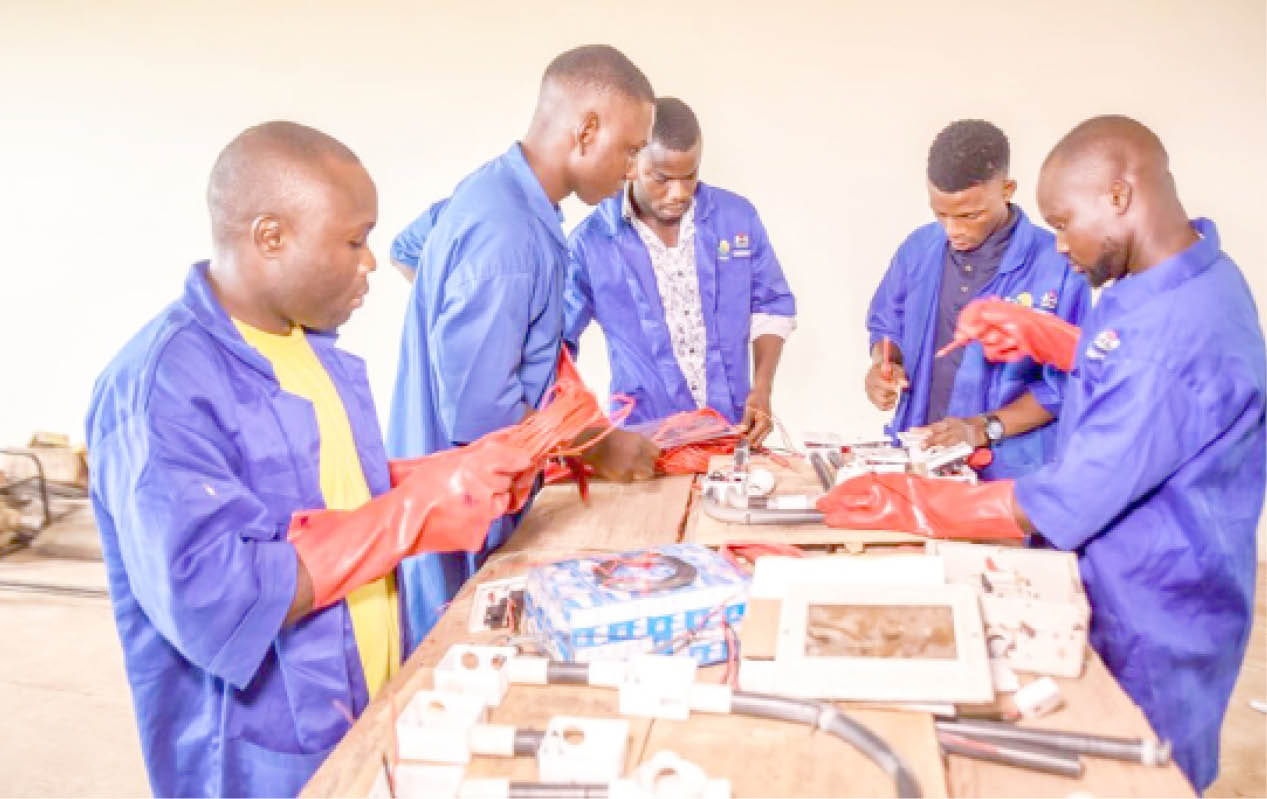BY TITUS ELEWEKE
The Igbo apprenticeship system also known as Igba Boyi has produced many billionaires in the Southeast. But the initiative is now on the brinks of extinction because the youth are no longer interested in it due to their crave for white collar jobs and get-rich-quick syndrome and other factors, Daily Trust on Sunday reports.
The system is an unpaid business apprenticeship/incubator model that offers young boys opportunities to learn business under the tutelage of a master for a certain number of years. It could be five to eight years. At the end of the apprenticeship, they are settled by their masters who empower them with reasonable amounts of money to start their own businesses.
- 2023: ‘It’s either Igbo produce the next president or be allowed to exit Nigeria
- Why Igbo Apprenticeship scheme on decline – Obiora Okonkwo
The initiative has produced numerous Igbo multi-billionaires such as the chairman of Innoson Motors, Chief Innocent Chukwuma, the CEO of Coscharis, Cosmas Maduka, the CEO of Ibeto Group of Company, Cletus Madubugwu Ibeto, the CEO of Chikason Group, Chief Alexander Chika Okafor, Senator Ifeanyi Ubah and others.
Findings by Daily Trust on Sunday indicate that Igba Boyi has been in practice for centuries. It helped the Igbo to quickly bounce back to the nation’s economic system after the Civil War.
The system was so popular and widespread that Harvard Business Review defined it as a stakeholder capitalism.
But worried by the decline, the CEO of the United Nigeria Airlines Company Limited, Dr Obiora Okonkwo, in 2020, instituted a N15 million research grant at the UNIZIK Business School (UBS) to do a research with a view to investigating the factors responsible for the decline and make recommendations for revival.
The research was titled: “Reinvigorating Igbo Entrepreneurial Behaviour through Enhanced Apprenticeship Scheme in Onitsha Markets, Anambra State.”
In 2021 ,UNIZIK Business School came up with some research findings and made a presentation.
While presenting the research findings, the Principal Investigator, Prof Nkemdili Nnonyelu, who decried the decline, said devaluation of family values and unbridled quest for materialism were responsible.
He recommended that the system should be reconceptualised to eliminate any form of stigma attached to the ‘Igba Boyi’ syndrome to make it attractive.
The research also found out that the name ‘Igba Boyi’ makes young boys in the trade feel humiliated.
Nnonyelu said Igba Boyi should be replaced with ‘Nkwado Ogalanya’ or ‘apprenticepreneurship.’
“We also found that the devaluation of family values and the new orientation of get-rich-quick mentality were some of the causative factors that have affected the state of Igbo apprenticeship,” he said.
Nnonyelu noted that apprenticeship had helped to inculcate values and advance entrepreneurs as co-creators of wealth and employers of labour.
He stressed the need to restore the loss of glory of the apprenticeship practice in Igboland.
During the presentation of the research findings, Okonkwo said he took the decision to offer the research grant after observing that the situation was no longer the same when he had a stint as an apprentice before jetting out to Russia for studies.
He applauded the research that it had fulfilled its purpose.
The Vice President, Professor Yemi Osibanjo, described the apprenticeship system as the most popular indigenous business initiative in Nigeria’s economic institution and recognized as the world largest business incubator.
The vice president stated this recently in Awka, Anambra State during the National Summit on Igbo Apprenticeship on the theme: “Repositioning the Igbo Apprenticeship Scheme for Sustainable Economic Development.”
Osinbajo said the initiative would add values to the already existing economic growth of the country.
Osibanjo who joined virtually said the scheme has the full potential to achieve for the Nigeria’s economy what similar apprenticeship schemes had achieved globally, especially in Germany and India.
As a Keynote speaker at the summit, Dr Obiora Okonkwo blamed the near extinction of ‘Igba Boyi’ on moral and ethical decay in the society.
He added that erosion of some fundamental values like honesty, discipline, diligence and hard work were responsible for get-rich- quick syndrome and the lack of patience to learn requisite skills that are pervasive among today’s youths.
“The apprenticeship system in Igboland began to suffer when apprentices, even in their very first weeks, began to aspire to become bigger than their masters,” he said.
“This has also led to situations where some apprentices go to lengths to seek to ‘control’ their bosses by diabolical means with the intention to take over their wealth,” he added.
He attributed the current upsurge in drug abuse and ritual killings among the youth to their quest for quick money as well as decline in moral and cultural values so much so that they have lost interest in learning skills to better their lots.
Okonkwo expressed delight that the older generation of Igbo businessmen, most of who were products of the apprenticeship system, became wealthy because they were guided by the values and ethics they were brought up with during their apprenticeship years.
“We must reinvent the apprenticeship system to be responsive to the business and industrial needs of today, along with the skills acquisition and value chain that such new processes require,” he said.
Retired Anglican Bishop of Isiukwuato/Umuneochi, Abia State, Reverend Samuel Chukwuka, attributed the decline in the apprenticeship system to misleading preachings by some men of God.
According to him, some of the men of God who are supposed to be moral compass of the society have disappointed the young ones in their preaching of gospel of God who preach that one can get rich through praying and fasting. This, he said, discourages the youth from learning skills to make a living.
“The church is seriously contributing to the moral decay and get-rich-quick syndrome in the society. Today, we talk about church in terms of building while the church is not about building, but the body of Christ. The so-called men of God are preaching riches, enemies must die and they are making money from the people,” Reverend Chukwuma said.
“People are going to prayer houses, seeking wealth. At the prayer houses they would tell people that God would prosper them even without work. They would tell you that after fasting and praying, God would prosper you. Why would people not rush there to be rich instead of learning skills that can bring the prosperity? Many youths are now resorting to deities having discovered that the churches are no longer preaching the truth,” the cleric stressed.
A-76-year-old tailor, Elder Joel Anichebe said: “The youths of today want to be rich by all means or die in the process. It was not like that in our days. Owing to quest for quick money the younger generation does not want to learn any skill. They want to get everything without working.”
“Parents, too, are also contributing to the moral decay in the society because they encourage their children to do evil if only that would fetch them money. The value system has died in Igbo land because both parents and children are looking for money at all cost,“ he added.
It’s difficult to go back to the apprenticeship values where there was respect for hard work. The quest for quick money has destroy the system. If you get anybody by chance who wants to learn a skill, he would drop out after six months, claiming that he had learnt the trade,” Anichebe said.
“Most youths today preferred riding motorcycle to get easy money to learning any skill that would sustain them in life. I learnt tailoring for four years and six months. Nobody will be hungry in life if he learns any hand work. If you don’t have any skill, you would be tempted to go into crime to survive,” he said.
“Parents should stop glorifying their children who display wealth without reasonable sources of income. We must encourage our children to learn trade and also be patient in learning skills,” added.
Sunday Onurgbo, a spare parts dealer in Nnewi said: “I think the way government has opened the eyes of the youths to money is discouraging them from learning skills. Government officials spend money carelessly and the boys are watching them. The way they display wealth publicly can discourage them from being patient to serve their masters for six to eight years,” he said.
“Some maters are also parts of the problem. When they open a store for their apprentice, they give him a target of the amount of money he will be paying every month. If the boy can not meet the target, he would do extraordinary things to meet up. This discourages some young ones from going into apprenticeship,” Onurgbo added.
Daily Trust on Sunday’s findings also indicated that some master’s failure not to ‘settle’ their apprentices, is another factor that account for the failure of the apprenticeship system.
Mr Martins Metuh, another spare part dealer at Nnewi New Motor Spare Parts, said:
“Owing to exposure to drugs and civilization, the youth of this generation are not ready to learn how to grow in life under the tutelage of a master. It is no longer lucrative to have ‘boyi’ again in your store because they are for destruction and not for building any more,” Metuh said.
“It is no longer safe to have apprentices. It is better to have sales girls or boys and you must open eyes to monitor them,” he added.
Metuh also attributed the failure of the apprenticeship system to parental failure.
“ One day, I went to a man and I asked him about his son who was supposed to be in the university and he said he was in Lagos doing clearing and forwarding. This is a boy he sent to university to study. But he did not spend up more than three years when he came back home with an expensive. But his father did not ask him, “my son, where did you get money to buy this car since you are still in school? How then can his mates go and learn a trade when they feel they can make money through any means?”
“You can not ask a boy to spend eight to nine years with you as an apprentice when his mates are making quick money without minding the consequences,” he added.
Metuh, however, said that being a graduate did not stop one from going for apprenticeship. He urged them, especially the unemployed, to go and learn trades and skills to earn a living.
“We must not allow buying and selling to die in Igbo land to die because it is God’s gift to us,’ he said.
Michael Nwaoba, another artisan, said that it was not easy for a graduate to go and learn a trade for years again after four or five years in the university.
He argued that all the trainings they received in the university were enough for them to do something for themselves.
He said that a typical Igboman had passed the level where he would stay for eight years under somebody as an apprentice, cleaning his house, and stores and even doing other domestic work for a man and his family after a university education.
“Government should put a measure to take care of the teaming youths who are not employed. One does not need to go for apprenticeship to be successful in life after serious training and learning in schools.
Why should a graduate go for five or eight years serving somebody and his family as an apprentice after becoming a university graduate? It is not just possible again, “he stressed.
A psychologist at Nnamdi Azikwe University, Awka, Dr (Mrs) Amaka Okafor, said that due to preference for riches to good name, the young ones are no longer interested in doing anything that would stress them. They prefer doing anything to get money quick instead of serving somebody for four or five years.
“Anchoring on this established fact as seen in our society today, our youths’ mindset and spontaneous actions only centere around how to make quick money and become the praise of the society. Thus, our youths see it as a Herculean ordeal to engage in the long process of lgbo apprenticeship, which, by virtue of patience, helped our older generation to build empires,” Okafor said.
She added: “The result of this mindset is epitomized in the glaring societal decay as seen or demonstrated in such actions and practices like ritual killings, kidnappings, Yahoo boys syndicate, cultism and others.
We should motivate our young ones and empower them at homes, schools, churches and the society at large. They must be encouraged to learn things for a living,’ she added.
Okafor said that Igbo apprenticeship would continue to decline until it goes into extinction if nothing urgent is done about it.

 Join Daily Trust WhatsApp Community For Quick Access To News and Happenings Around You.
Join Daily Trust WhatsApp Community For Quick Access To News and Happenings Around You.


